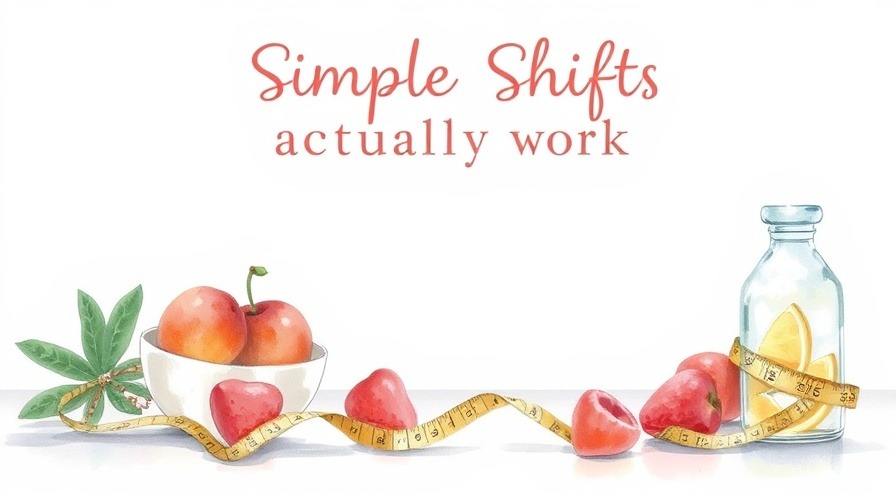
Ditching the Diet Drama: Simple Shifts That Actually Work for Weight Loss
Have you ever started a diet on Monday, only to find yourself face-first in a pint of ice cream by Wednesday evening? You're not alone. The problem isn't your willpower—it's the dieting approach itself.
Why Traditional Diets Set You Up for Failure
Let's be honest: traditional diets are like that flaky friend who promises to help you move but never shows up. They make big promises but deliver short-term results at best.
According to Dr. Traci Mann, who has studied dieters for more than 20 years at the University of Minnesota,
"Diets don't work in the long term. Dieters typically lose 5-10% of their starting weight in the first six months, but at least one-third to two-thirds of people regain more weight than they lost within four or five years" (Mann et al., Journal of Health Psychology, 2018).
Yikes. Not exactly the motivational speech you were hoping for, right?
The Small Shifts Philosophy
Instead of dramatic overhauls that make you miserable, research supports making tiny, sustainable changes that you barely notice. Dr. Brian Wansink, former director of the Cornell Food and Brand Lab and author of "Mindless Eating," found that people who made three small, manageable changes to their eating habits lost more weight and kept it off longer than those who tried complete diet makeovers.
"The best diet is the one you don't know you're on," says Wansink. "Small changes that become habits lead to permanent weight loss because they don't rely on willpower, which is a limited resource."
So what are these magical small shifts? Let's break them down.

1. Become a Food Detective (Not a Food Prisoner)
Instead of declaring certain foods "off-limits" (which just makes you want them more—hello, forbidden fruit syndrome!), get curious about your eating patterns.
Dr. Michelle May, founder of the "Am I Hungry?" Mindful Eating Program, suggests asking yourself one simple question before eating: "Am I actually hungry right now?"
"Most people are surprised to discover they eat for many reasons besides physical hunger," May explains. "Boredom, stress, habit, and social pressure trigger a significant amount of eating."
A 2019 study in the Journal of Behavioral Medicine found that participants who practiced this simple hunger awareness technique naturally reduced their caloric intake by about 300 calories per day without feeling deprived.
Try this tiny shift: Before reaching for food, pause for 10 seconds and rate your hunger on a scale of 1-10. Aim to eat when you're at a 3 or 4 (hungry but not starving), not at a 1 (ravenous) or a 7 (already satisfied).
2. Upgrade, Don't Eliminate
Instead of telling yourself "no carbs" (which your brain hears as "BE OBSESSED WITH CARBS"), focus on upgrading your current choices.
"Most sustainable weight loss comes not from elimination but from substitution," says registered dietitian Dawn Jackson Blatner, author of "The Superfood Swap."
For example:
Love pasta? Try swapping half your portion with spiralized zucchini.
Can't live without tacos? Use lettuce wraps for two out of your three tacos.
Coffee with cream and sugar? Try oat milk and a sprinkle of cinnamon.
A 2021 study in the International Journal of Behavioral Nutrition and Physical Activity found that this "small substitutions" approach resulted in an average 7% weight reduction over 12 months—and most importantly, participants maintained the loss at the two-year follow-up.
Try this tiny shift: Each week, identify one food you eat regularly and find a slightly healthier alternative that still satisfies you. The key word is "slightly"—baby steps are sustainable steps!

3. Move More, Stress Less About "Exercise"
The word "exercise" conjures up images of spandex, sweat, and suffering for many people. What if we just called it "movement" instead?
Dr. Michelle Segar, Director of the University of Michigan's Sport, Health, and Activity Research and Policy Center, has found that people who exercise for immediate benefits (like better mood, more energy, or stress relief) stick with it longer than those exercising primarily for weight loss.
"When physical activity is viewed as a chore or obligation, adherence plummets," says Segar. "When it's viewed as a gift to yourself—a source of immediate pleasure and well-being—consistency skyrockets."
A 2020 review in Psychology of Sport and Exercise confirmed that focusing on the immediate positive feelings from physical activity predicted long-term adherence better than focusing on distant outcomes like weight loss.
Try this tiny shift: Find pockets of movement you actually enjoy. Dance while brushing your teeth. Take the scenic route to the bathroom at work. Challenge yourself to never take an elevator for fewer than three floors. These micro-movements add up to real calories burned without requiring dedicated "workout time."

4. Sleep Your Way to a Healthier Weight
Here's the weight loss hack too few people talk about: sleeping more might be more effective than eating less.
Dr. Matthew Walker, neuroscientist and author of "Why We Sleep," has documented how sleep deprivation wreaks havoc on the hormones that regulate hunger and satiety.
"When sleep-deprived, the hormone that signals fullness (leptin) decreases, while the hunger hormone (ghrelin) increases," Walker explains. "Simultaneously, the reward centers in your brain become more sensitive to junk food."
Talk about a triple threat. In one striking study published in the Annals of Internal Medicine, dieters who slept 8.5 hours lost 55% more body fat than those sleeping 5.5 hours, despite following identical diets.
Try this tiny shift: Go to bed just 15 minutes earlier each night for a week. The following week, add another 15 minutes. Small, gradual changes to sleep habits are more sustainable than dramatic overhauls.
5. Build Your Plate Backward
Most Americans build meals around a protein (usually meat) and a starch. What if you flipped the script?
"Start with vegetables as the main attraction, then add protein, healthy fats, and a small portion of complex carbohydrates," suggests Dr. David Ludwig, endocrinologist and professor of nutrition at Harvard School of Public Health.
Ludwig's research, published in The BMJ, found that this approach naturally reduces calorie intake while maximizing nutrition—no counting required.
Try this tiny shift: Use the "half plate" rule—fill half your plate with non-starchy vegetables before adding anything else. This simple visual cue helps recalibrate portions without any measuring or tracking.

The Bottom Line: Trust the Process (and Yourself)
Sustainable weight loss isn't about white-knuckling through deprivation or following complicated rules. It's about making small, enjoyable changes that eventually become your new normal.
"The goal isn't perfection but progress," reminds Dr. Yoni Freedhoff, medical director of the Bariatric Medical Institute and author of "The Diet Fix." "The best weight-loss strategy is one that enhances your quality of life, not diminishes it."
Remember, you're playing the long game here. That 0.5-pound loss that happens consistently over time beats the 5-pound crash diet loss that boomerangs back every single time.
Let's ditch the diet drama together, one small shift at a time.
Disclaimer: This article is for informational purposes only and does not constitute medical advice. Always consult with a healthcare provider before making significant changes to your diet or exercise routine, especially if you have underlying health conditions.
 Add Row
Add Row  Add
Add 




 Add Row
Add Row  Add
Add 

Write A Comment